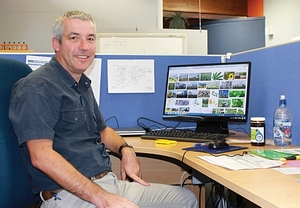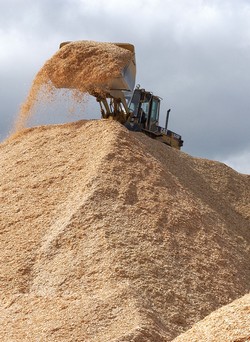New science leader fuels greener business opportunities

Dr Paul Bennett, Scion's new Science Leader for Clean Technologies
Investigating opportunities for the bioenergy sector in New Zealand is high on Dr Paul Bennett’s list of priorities once he has familiarised himself with his new role at Scion, that of Science Leader for Clean Technologies.
Paul recently joined Scion’s Rotorua campus from England having spent over 25 years working on a range of fuels, biofuels and bioenergy issues. He has worked as an independent consultant, for quasi-government organisations and for BP in roles which took him throughout the UK, Asia, South America and Africa developing new technologies and business opportunities for biofuels.
First on Paul’s agenda at Scion was attending the International Energy Agency (IEA) Bioenergy executive committee meeting in Brussels in October, of which Scion is a member and funder on behalf of New Zealand.
“The key focus of the IEA Bioenergy is the promotion of bioenergy globally, the strengthening of national capabilities through international collaboration and accelerating the deployment of new technologies,” says Paul.  Increasing concerns around climate change, energy security and agricultural development is driving the rise of industrial biotechnology worldwide, indicating an increasing shift away from industrial practices that rely heavily on fossil fuels, man-made chemicals and non-renewable materials. Scion’s bioenergy and biofuels research aligns well with the IEA’s objectives to enhance energy efficiency and increase the share of renewables in the mix, and supports the move towards a bio-based economy in New Zealand. Our scientists are investigating new economic opportunities in such things as industrial biorefining, bioenergies and bio-based substitutes for petroleum and other declining resources.
Increasing concerns around climate change, energy security and agricultural development is driving the rise of industrial biotechnology worldwide, indicating an increasing shift away from industrial practices that rely heavily on fossil fuels, man-made chemicals and non-renewable materials. Scion’s bioenergy and biofuels research aligns well with the IEA’s objectives to enhance energy efficiency and increase the share of renewables in the mix, and supports the move towards a bio-based economy in New Zealand. Our scientists are investigating new economic opportunities in such things as industrial biorefining, bioenergies and bio-based substitutes for petroleum and other declining resources.
A recent funding boost by MBIE will see Paul and his team investigate potential synergies across the bioenergy sector that, through appropriate use of waste streams from some companies, could release biomass for use as an input to other companies or for application in new products. A more productive use of sustainable resources, by-products and residuals will be beneficial to both industry and environment alike.
In this Industrial Symbiosis Project Paul explains, “we will be looking at three case studies, in particular the Kawerau Industrial cluster where there is the potential for industries to use geothermal energy and release biomass for other purposes.
“The outcome of this research could help establish New Zealand as a showcase for a smarter, cleaner and greener way of doing business”.
For further information
Contact Show email
